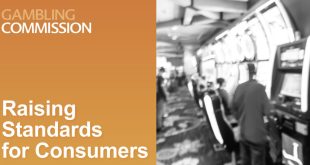
The UK Gambling Commission’s Programme Director for Consumer Protection & Empowerment, Ian Angus, has recently made a speech in which he called for “a proper and constructive debate about gambling marketing and advertising, including sponsorship arrangements in sport”.
His speech included the following stark message to holders of operating licences granted by the Commission: “My advice to you is this: a storm is gathering, but it can be avoided. Learn from the mistakes of the past – listen to what the public is saying and put responsible advertising standards at the very heart of your business. Don’t wait for the storm clouds to burst and precautionary measures to be triggered. Step up now and own this.”
There will undoubtedly be readers of this article who will take the view that the majority of gambling operators comply with the applicable advertising codes and conduct their marketing activities in a socially responsible manner that fully complies with all legal and regulatory requirements. I agree with that.
There will be some who additionally take the view that Ian Angus’s comments represent a considerable over-statement of the severity of the position. I don’t agree with that. Such a view ignores public sentiment that has become ever more negative over the last year. The easy response is to blame sensationalist adverse media reports, but that ignores how bombarded with, and pestered by, gambling advertisements – particularly for football betting – many people feel.
Again to quote Ian Angus: “At a time when consumer trust in gambling is at an all-time low, it would be unwise for the industry to ignore the hardening public and political mood around advertising. For some, it’s a moral reaction; for others, it’s an irritant – “stop bombarding me with gambling ads!” – but for many, including a growing number of researchers and academics, it reflects a genuine concern about the unknown impacts of children’s exposure to gambling advertising and sports sponsorship”.
A quick bit of legislative history
Once upon a time, as a matter of UK government policy, the advertising of gambling products was tightly restricted as part of an overall desire not to stimulate demand and different rules applied to different sectors of the gambling industry. For example, betting shops were only allowed to advertise in “material form” (such as newspapers, journals and posters etc.) and were banned from advertising on radio or television. That was a long time ago now. The legislation in place at that time was not designed for online advertising, let alone online gambling.
A quick bit of current law
The Gambling Act 2005 provides a very broad definition of “advertising”, covering anything that is done to encourage or facilitate people to take advantage of (or intending to increase the use of) facilities for gambling, including entering sponsorship or brand-sharing agreements.
Gambling advertising issues in the last 12 months
I set out below a summary of what has happened on the gambling advertising front within the last year or so alone, most of which featured in Ian Angus’s speech:
- Setting the scene for a lot of what was to follow, a House of Lords debate expressed considerable concern about the effect of gambling advertisements on children
- Sky Betting & Gaming set the trend by becoming the first operator to announce the closure of its affiliate marketing programme, citing“growing regulatory requirements”, a move followed subsequently by others
- At the same time, the Advertising Standards Authority (“ASA”) upheld complaints against four online gambling companies for shockingly irresponsible adverts published by an affiliate suggesting that gambling could provide an escape from personal problems such as cancer-related depression and that it could be a solution to financial concerns
- Not surprisingly, just a few months later, the Information Commissioner’s Office (“ICO”) reported that a global intelligence-gathering operation found that the affiliate marketing industry generally has significant compliance issues to overcome
- National newspaper allegations were made that cartoon characters are exposing children to online gambling, resulting in unprecedented joint action by regulators (and the Remote Gambling Association) to prevent gambling ads appealing to children
- This was followed with yet further adverse media publicity on the promotion of gambling to children and young persons, a subject that hit the headlines again in May with adverse ASA rulings
- The Gambling Commission imposed a penalty package of £100,000 on Broadway Gaming Limited for failing to include significant terms linked to promotional advertisements on five of its gambling websites
- This was followed by new Committee of Advertising Practice standards on ‘free’ bets and bonuses introduced with immediate effect in February, coinciding with the Competition and Markets Authority ordering online gambling operators to stop unfair bonus promotions
- One month later, Sky Betting & Gaming was required to pay over £1million for social responsibility failings, that included about 50,000 self-excluded customers receiving marketing material by email, mobile text or a push notification within a mobile app
- This was followed by tougher standards on gambling advertising coming into effect on 2 April 2018, restricting ads that create an inappropriate sense of urgency like those including“Bet Now!” offers during live events
- The Gambling Commission’s GDPR Information Note published that same month referred to its, and the ICO’s, concern about the volume of unsolicited direct e-marketing received by consumers (predominantly via email and SMS) for gambling products
- In May, LeoVegas incurred a £627,000 penalty package for issuing 41 misleading advertisements and for self-exclusion failings, that included sending marketing material to 1,894 people who had previously self-excluded
- The Gambling Commission warned of a ‘relentless escalation’ in financial penalties for compliance failings shortly after publishing its enforcement report for 2017-18, listing marketing and advertising by gambling operators in its top six regulatory concerns
- Nevertheless, the passing months saw a mounting number of adverse ASA rulings against gambling operators
- In September, BBC’s ‘5 Live investigates’ transmitted a radio programme entitled “Children Targeted by Gambling Ads” after its researchers discovered that 15 football clubs in the Premier League, the Championship, League One and the Scottish Professional Football League were in breach of the advertising rules by promoting gambling ads on the junior pages of their club websites
- Little surprise that, at about the same time, the Gambling Commission published its advertising and sponsorship rules reminder ahead of the imminent changes to its Licence Conditions and Codes of Practice that mean that, with effect from 31 October, gambling operators who breach advertising rules or consumer law will face tougher enforcement action
- Also last month, the Labour Party announced its plans for a radical overhaul of gambling regulation and advertising, plans that seem to be attracting support in sections of the Conservative Party too
- In the last few days, penalty packages totalling nearly £2.8million have been incurred by the Rank Group, independent bookmaker Mark Jarvis and Paddy Power Betfair for, amongst other things, customer interaction failings, that sends a clear message to the gambling industry that the Gambling Commission will continue to come down hard on operators who do not take the required steps to stop harmful gambling by customers to whom they market their services.
The debate
So what should be discussed as part of the debate about gambling marketing and advertising, including sponsorship arrangements in sport? I list below some suggestions:
- In Australia, bans on gambling advertising during broadcasts and online streaming of live sport between 5 am and 8.30 pm have been introduced. Is this, or an alternative pre-watershed ban, a model that should be followed in the UK?
- It has been reported that the Spanish government’s 2019 budget announcement is expected to include advertising restrictions for licensed gambling. Will they follow Italy’s blanket ban on gambling advertising across all media platforms (including sponsorship of sports clubs by gambling operators), due to take effect from 1 January 2019? Is the situation so dire in the UK that a similar ban should be imposed here?
- In light of the above, is the Labour Party’s proposed “whistle-to-whistle” ban on gambling adverts being shown during a specified time before, during and after a live sporting event an acceptable compromise?
- Alternatively, can all sectors of the UK’s gambling industry come together sufficiently quickly to agree an even tighter Gambling Industry Code for Socially Responsible Gambling before much harsher mandatory restrictions are imposed on them?
- Should such a revised code include the prohibition of gambling advertising within sports grounds (pitch-side and otherwise) and in their immediate vicinity?
- Should the fact that betting is regarded as merely part of the normal enjoyment of sport override concerns that betting advertising normalises gambling for children?
- To what extent can gambling advertising overcome the “normalisation” criticism, taking into account the very recently published CAP/BCAP explanatory document on that subject?
- Are there any acceptable compromises to avoid a potential complete ban on British sports clubs’ shirt sponsorship by gambling companies including, for example, prohibiting their logos or other promotional material from appearing on any commercial merchandising, rather than merely on replica kits and other merchandise that is designed for use by children?
- Is it already too late now for an affiliates’ trade association to be set up requiring compliance with a minimum set of advertising and marketing standards for membership, although, of itself, that would not absolve gambling operators from liability for their affiliates’ failings (and would it make any difference anyway)?
- Is it only tougher penalties for breaching the UK Advertising Codes, the GDPR rules on marketing consent or consumer law that will bring about the change in approach gambling advertising the Gambling Commission is calling for?
- Should any further action await further research on the effects of gambling marketing and advertising on children, young people and vulnerable adults?
- Should the UK gambling industry “swallow the bullet” (mixing of metaphors intended) and voluntarily accept the Labour Party’s proposal fora compulsory levy on gambling operators of 1% of gross gambling yield and, if so, should it be on condition that it has a greater say in what research, education and treatment of problem gambling takes place?
These are not proposals. They are merely ideas and, with Responsible Gambling Week almost upon us, what better time to start the debate?
On that front, I will leave the final words to Ian Angus, again from his recent speech: “Advertising is the lens through which consumers and the wider public judge you, your brand and the wider industry. It’s the first thing they see or hear; and first impressions matter. The decline in public trust and confidence reflects badly on us all – and it needs to be reversed”.
___________________________
David Clifton – Director – Clifton Davies Consultancy Limited










